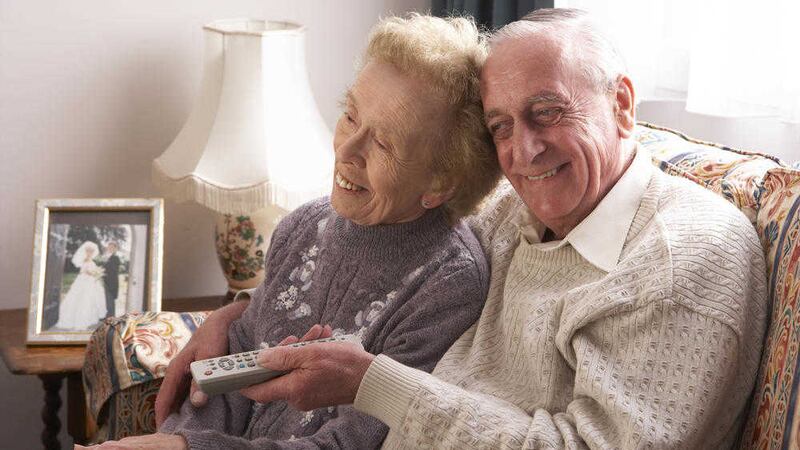The Department of Social Development has just shone its annual spotlight on pensioner incomes in Northern Ireland. Its annual ‘Family Resources Survey (FRS)' was first carried out here in 2003/04, which means that 10-year perspectives have been possible this year for the first time.
Figures showing pensions growth within Northern Ireland are taken with this new 10-year perspective, while some other figures – in particular those looking at the region within the context of the UK – are taken over the three years from 2011-14.
And here are some interesting facts of life for pensioners in Northern Ireland today:
:: You’re likely to be worse off as a single pensioner, rather than part of a pensioner couple.
:: If you are a single, in terms of income you’re better off being a man than a woman.
:: You’re better off as a younger pensioner (in your 60s) than as an over-75.
Before we look at the detail for Northern Ireland, let’s ‘zoom out’ and look at how we compare to other regions of the UK.
If this question has just given you that sinking feeling, you’re not alone. It’s a question that always seems a bit of a ‘downer’, no matter which area of endeavour we’re referring to. In terms of our pension incomes, unfortunately, things are no different.
The fact is that our single pensioners had the lowest median gross income of all regions of the UK, over the past three years. Our single pensioner’s median weekly income was £279, bottom of the pile behind Wales (£291), Scotland (£299), and England (£325), and a full £50 a week short of the UK average of £319.
Part of the reason for this may be the stagnation in incomes here over 10 years. For single pensioners, the median net weekly income, after housing costs, in Northern Ireland was £203. This is a similar level, in real terms, to the levels 10 years ago in 2003/04.
Our pensioner couples fare slightly better in the UK comparison, coming out ahead of their Welsh counterparts with a weekly gross income of £583, compared to £562 in Wales, but lagging far behind Scotland (£653), England (£678) and the United Kingdom average of £667.
How have our general levels of pension income in Northern Ireland improved in 10 years? The answer is: not much.
Although there have been fluctuations along the way, the median gross weekly income has increased by just £6, from £405 to £411. This is before paying housing costs. After housing costs, median incomes have risen by £9 per week in the 10 years from 2004 to 2014, from £257 to £265.
As mentioned above, pensioner couples have been faring better than single pensioners over the past decade.
Pensioner couples’ median net income after housing costs has increased since 2003/04 by around 6 per cent to £383. Couples also appear to be faring better in terms of benefits: our pensioner couples in Northern Ireland had the highest benefit income of all couples in the UK, while single pensioners’ benefit income, at £187, was comparable with the rest of the UK. In 2011/14, pensioner couples in Northern Ireland had weekly benefit income of £246, £10 per week ahead of the UK average of £236.
Age also has an effect on your likely income. As an older pensioner here, over 75 years old, you are likely to have a lower weekly income than younger pensioners. Pensioner households where the head is 75 years old or over had a median net income of £224 after housing costs in 2013/14. This was £74 lower than the £298 received by households where the head is under 75.
Taking a brief look at our income from the state pension now, and 98 per cent of all Northern Ireland pensioner households received the state pension in the three years from 2011-14, just ahead of the UK average of 97 per cent, and 3 per cent higher than a previous measure taken in Northern Ireland in 2003-06.
We are also a little behind the rest of the UK, in our likelihood to have either workplace and/or personal pensions to fund our retirement.
Just over half of us (51 per cent) receive some income from private pensions, but only a third of us (32 per cent) achieve more than half of our income from them, compared to 40 per cent of pensioners over the whole of the UK. Nonetheless, this is an encouraging increase of 6 per cent over NI levels of 10 years ago.
We mentioned earlier that women in Northern Ireland tend to have a lower pension income than men. Taking incomes across Northern Ireland in 2011/14, and ranking incomes from highest to lowest, 26 per cent of men had incomes in the top quintile or top fifth of the chart, while only 18 per cent of women achieved this level.
It comes as no surprise that this is a general pattern throughout the UK, as women are more likely than men to have a career break during their working life, usually to raise children. In the whole of the UK, 22 per cent of single male pensioners are in the top fifth of income distribution, compared to 19 per cent of single female pensioners.
If you are likely to retire in one of the more vulnerable groups identified in this report, there are various steps you can take now to ‘bump up’ your projected pension income.
For instance, you could make additional voluntary contributions to a workplace pension, which some employers are prepared to match, effectively giving you ‘free money’ that you otherwise might not have had. It may also be possible to add to your state pension entitlement by purchasing extra years of contributions.
:: Michael Kennedy is an independent financial adviser and pensions specialist, and can be contacted on 028 71886005.








